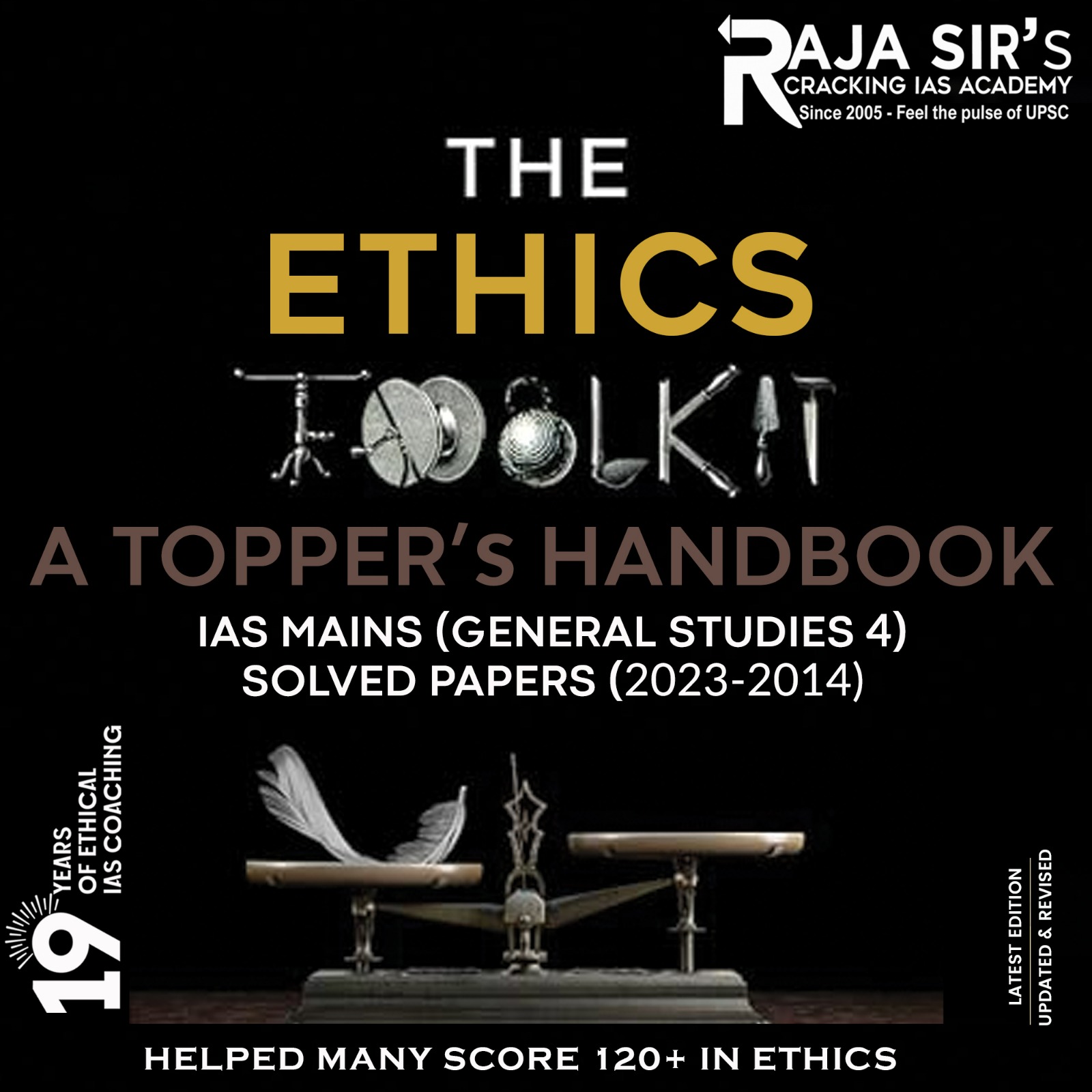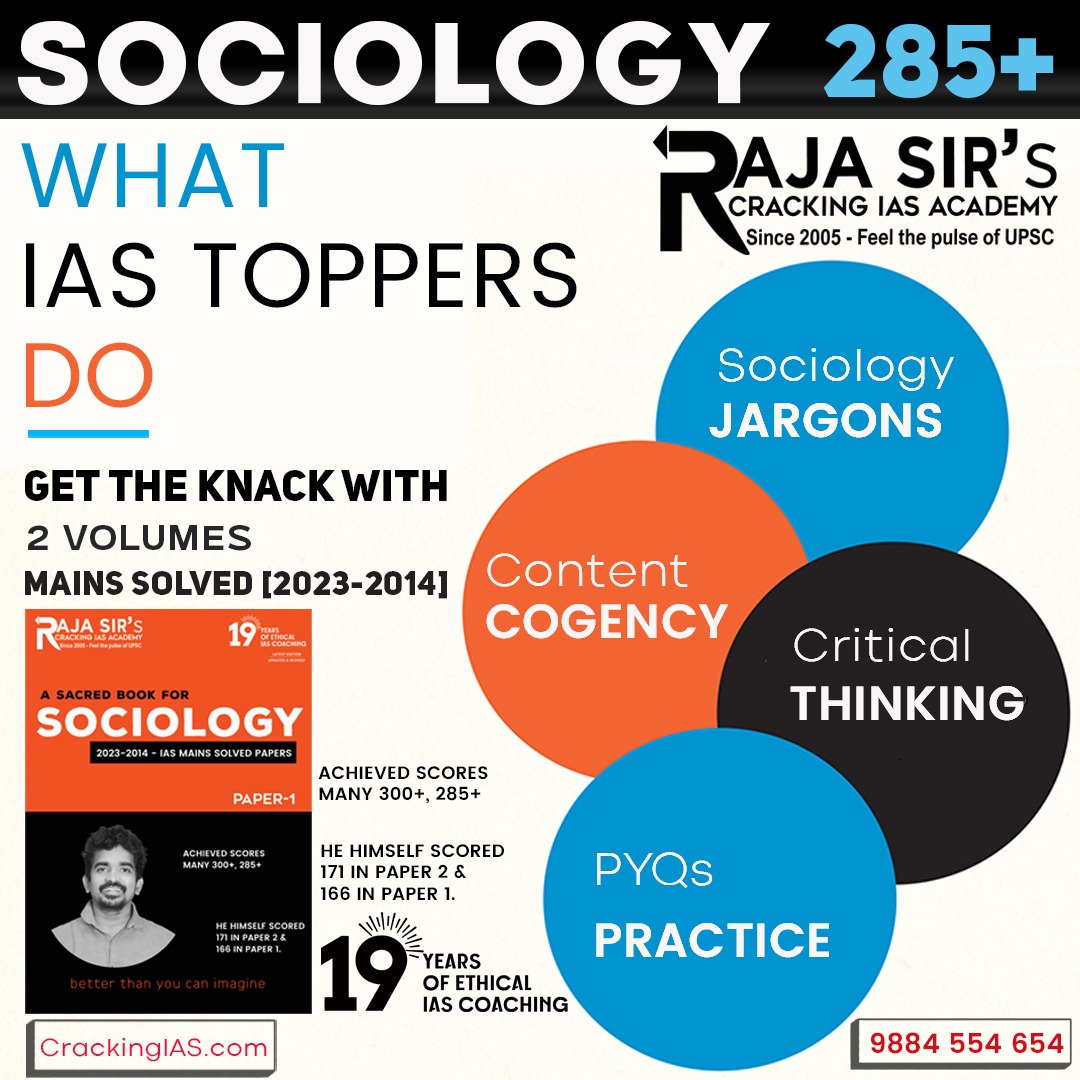- Home
- Prelims
- Mains
- Current Affairs
- Study Materials
- Test Series
 EDITORIALS & ARTICLES
EDITORIALS & ARTICLES
Hit List Questions 79-PPP 100 PRELIMS 2024 - 97
Questions & Explanations:
|
1. |
I. Red light is the most effective wavelength for photosynthesis. II. Green House effect enhances the rate of photosynthesis. Which of the above statements is/are true?. (a) Only I (b) Only II (c) Both I & II (d) Neither I nor II
|
|
2. |
“Cysteine-cysteine chemokine receptor 5” in news is a (a) Plasmid (b) Lipid (c) Sugar (d) Protein
|
|
3. |
Dinosaurs were (a) Cenozoic reptiles (b) Mesozoic aves (c) Paleozoic amphibians (d) Mesozoic reptiles
|
|
4. |
Which one of the following diseases is caused by Lyssavirus? (a) Shigellosis (b) Leprosy (c) Kyasanur Forest Disease (d) Rabies
|
|
5. |
Consider the following statements: 1. Non-function of lachrymal gland is an important symptom of deficiency of Vitamin A. 2. Deficiency of Vitamin B1 can lead to indigestion and heart enlargement. 3. Vitamin C deficiency can lead to pain in the muscles. 4. Deficiency of Vitamin D causes increased loss of Ca++ in urine. Which of the statements given above are correct? (a) 1 and 2 (b) 2, 3 and 4 (c) 1, 3 and 4 (d) 1, 2, 3 and 4
|
|
6. |
Which of the following plants can be vegetatively propagated by leaf pieces ? (a) Bryophyllum (b) Chrysanthemum (c) Agave (d) Asparagus
|
|
7. |
“Injaz” seen in news sometimes in the context DNA Technology related news refer to (a) Cloned Camel (b) Cloned Cow (c) Cloned Buffalo (d) Cloned Deer
|
|
8. |
DNA is uniquely suited to store and transmit genetic information from generation-to- generation, because of its (a) Complementary to the two strands (b) Double helix (c) Number of base-pairs per turn (d) Sugar-phosphate backbone
|
|
9. |
Which of the following is filled in air-tight packets of potato wafers and other food products thus preventing the growth of fungus and insects in them? (a) Nitrogen (b) Oxygen (c) Both (a) and (b) (d) Neither (a) Nor (b)
|
|
10. |
Consider the following animals: 1. Sea cow 2. Sea horse 3. Sea lion Which of the above is/are mammal/ mammals? (a)1 only (b)1 and 3 only (c)2 and 3 only (d)1, 2 and 3
|
|
11. |
Which of the following statements are correct? 1. ZyCoV-D the world''s first and India''s indigenously developed vaccine for COVID-19 is m-RNA based. 2. m-RNA vaccines are third-generation vaccines. 3. DNA vaccine will avoid extracellular degradation. 4. DNA vaccines induce innate immune responses. Select the correct answers using the codes given below. (a) 2 and 3 only (b) 1, 3 and 4 only (c) 2 and 3 only (d) 1, 2, 3 and 4
|
|
12. |
Consider the following statements. 1. In tropical regions, Zika virus disease is transmitted by the same mosquito that transmits dengue. 2. Sexual transmission of Zika virus disease is possible. Which of the statements given above is/are correct? (a) Only 1 (b) Only 2 (c) Both 1 and 2 (d) Neither 1 nor 2
|
|
13. |
Which type of white blood cells are concerned with the release of histamine and the natural anticoagulant heparin? (a) Monocytes (b) Neutrophils (c) Basophils (d) Eosinophils
|
|
14. |
1. Adenoviruses are non-enveloped, double-stranded DNA viruses. 2. A retrovirus is a virus that uses RNA as its genetic material. 3. AIDS is caused by a retrovirus. How many of the statements given above is/are correct? (a) Only 1 statement (b) Only 2 statements (c) All the 3 statements (d) None of the statements
|
|
15. |
Which of the following is/are true w.r.t. Echidna? 1. It is a member of the monotreme. 2. It lacks teeth and has rudimentary electroreception. (a) 1 only (b) 2 only (c) Both 1 and 2 (d) Neither 1 nor 2
|
|
16. |
1. Poison gland of snakes is homologous to the salivary glands of vertebrates. 2. Poison fangs of snakes are canine teeth. Which of the statements given above is/are correct regarding Snakes?. (a) 1 only (b) 2 only (c) Both 1 and 2 (d) Neither 1 nor 2
|
|
17. |
The endometrium is the tissue that is found in (a) Brain (b) Uterus (c) Kidney (d) Heart
|
|
18. |
3HP drug in news is related to (a) Jaundice (b) AIDS (c) TB (d) Malaria
|
|
19. |
Ringing/girdling experiments prove that (a) Phloem is responsible for the translocation of food (b) Xylem is responsible for the ascent of sap (c) Transpiration pull (d) Both (a) and (b)
|
|
20. |
1. Pancreas is an endocrine as well as an exocrine gland. 2. Pancreatic juice contains bicarbonate. (a) Only 1 is true (b) Only 2 is true (c) 1 & 2 are true (d) Neither (1) nor (2) is true |
|
21. |
1. It has blue blood. 2. It has nine brains. 3. It is a cephalopod. Which of the statements given above is/are correct about octopus? (a) 2 only (b) 1 and 3 only (c) 2 and 3 only (d) 1, 2 and 3
|
|
22. |
What is Kilonova? (a) A cosmic event that occurs when stars die. (b) A cosmic event that occurs when a neutron star smashes into another neutron star. (c) A cosmic event that occurs when Raman Scattering is nullified. (d) A cosmic event that occurs when two galaxies collide.
|
|
23. |
1. Dog Fish 2. Sea Horse 3. Silver Fish 4. Star Fish Which one of the following is/are true fish? (a) 1 and 2 (b) 1 and 3 (c) 1, 3 and 4 (d) None of these
|
|
24. |
I. They are RNA segments. II. All organisms whether prokaryotic or eukaryotic contain transposons. Which of the above statements is/are true w.r.t. transposons?. (a) Only I (b) Only II (c) Both I & II (d) Neither I nor II
|
|
25. |
1. They are crepuscular. 2. Their IUCN status is Vulnerable. 3. They are listed under Appendix I of the Convention on International Trade of Endangered Species. 4. The snow leopard is the state animal of Ladakh. The correct statements w.r.t. Snow leopards include (a) 1, 2 and 3 (b) 1 and 3 (c) 2, 3 and 4 (d) 1, 2. 3 and 4
|
EXPLANATIONS
|
1. |
Chlorophyll absorbs light in the red region. Because red light has the highest absorption by chlorophyll, it is the most effective wavelength for photosynthesis. In photosynthesis, green light is the least effective. The carbon dioxide fertilization or carbon fertilisation is not only the cause of plant growth but also contributes the greening effect. It is the phenomena that the increase of carbon dioxide in the atmosphere increases the rate of Photosynthesis in plants can occur in artificial light, provided the plant receives the correct wavelength of the light spectrum. Maximum photosynthesis occurs between 600-700 nm in the red end, which is followed by 400-500 nm in the blue region, and the least between 500-600 nm in the green region. |
B |
||||||||||||||
|
2. |
D |
|||||||||||||||
|
3. |
D |
|||||||||||||||
|
4. |
D |
|||||||||||||||
|
5. |
Refer our Biology General Science Book. |
D |
||||||||||||||
|
6. |
In Bryophyllum and Kalanchoe, the plants can vegetatively propagate while the leaves still are attached to the branch. The leaves of this plant begin the process of mitosis and asexually reproduce in the form of plantlets that cover the edges of each leaf. Once these plantlets develop, they drop off and grow into new plants when they find fertile ground. |
A |
||||||||||||||
|
7. |
https://www.equisport.pt/en/news/dubai-scientists-create-first-cloned-camel/ |
A |
||||||||||||||
|
8. |
Complementary base pairing in the DNA double helix (with its complementary DNA strands) describes the manner in which deoxyribose- nucleotides bind to each other. Essentially it means that the bases are arranged along the molecule such that the chains fit together snugly so as to be lightly secured by hydrogen bonds. |
A |
||||||||||||||
|
9. |
|
ü A |
||||||||||||||
|
10. |
· Sea cow: Sea cow, also known as dugong, is a marine mammal found in the Indian and Pacific Oceans. It is herbivorous and feeds on sea grass. It can grow up to 3 meters in length and weigh up to 600 kg. It is classified as vulnerable by the International Union for Conservation of Nature (IUCN) due to habitat loss and hunting. · Sea lion: Sea lion is a marine mammal that belongs to the family Otariidae. It is found in the waters of the Pacific Ocean and breeds on the beaches of California, Mexico, and the Galapagos Islands. It is carnivorous and feeds on fish, squid, and octopus. It can grow up to 2.5 meters in length and weigh up to 350 kg. It is classified as least concern by the IUCN. · Sea horse: Sea horse is a marine fish that belongs to the family Syngnathidae. It is found in the shallow tropical and temperate waters around the world. It is carnivorous and feeds on small crustaceans. It can grow up to 35 cm in length and weigh up to 200 g. It is classified as vulnerable by the IUCN due to habitat loss and overfishing. |
B |
||||||||||||||
|
11. |
The ZyCoV-D is the world''s first and India''s indigenously developed DNA based vaccine for COVID-19. DNA vaccines induce an adaptive immune response. The first-generation vaccines consist of live attenuated/ heat-killed vaccines in which whole organisms in the weakened live form or heat-killed form are injected. Second-generation vaccines are those vaccines in which isolated deactivated toxins are given. Third-generation vaccines are those in which recombinant techniques are used for the production of vaccines. In this technique DNA encoding, the antigen is inserted into a vector which will be recognized as a pathogen in the host. Such that the host immune system generates an immune response against the vector and thereby the antigen. DNA Vaccines · DNA vaccines use engineered DNA to induce an immunologic response in the host against bacteria, parasites, and viruses. · The basic working principle behind DNA vaccine involves the use of a DNA plasmid that encodes for a protein that originated from the pathogen in which the vaccine will be targeted. · DNA vaccine will avoid extracellular degradation and successfully enter the nucleus of target cells to induce a long-term immune response. · It is considered to be more stable, cost-efficient, and easier to handle than traditional vaccines. |
A |
||||||||||||||
|
12. |
https://www.thehindu.com/sci-tech/health/what-is-zika-virus/article18714568.ece |
C |
||||||||||||||
|
13. |
The basophils are probably like mast cells connective tissue. They release heparin, histamine and serotonin. Their nucleus is usually three-lobed and their granules take basic stain strongly. Monocytes are largest of all types of leucocytes. Their nucleus is bean-shaped.They are motile and phagocytic in nature. They engulf bacteria and cellular debris. Generally, they will change into macrophages after entering tissue spaces. The basophils are probably like mast cells connective tissue. They release heparin, histamine and serotonin. Their nucleus is usually three-lobed and their granules take basic stain strongly. Monocytes are largest of all types of leucocytes. Their nucleus is bean-shaped.They are motile and phagocytic in nature. They engulf bacteria and cellular debris. Generally, they will change into macrophages after entering tissue spaces. |
C |
||||||||||||||
|
14. |
https://iasgoogle.com/n/feb-21-2023-current-affairs AIDS (acquired immunodeficiency syndrome) is caused by the HIV virus(retrovirus) HIV (Human immunodeficiency virus) belongs to the special class of viruses called retrovirus. Within this class HIV is placed in a subgroup called lentivirus. HIV consists of a viral envelope. within the viral envelope 2 identical copies of single-stranded RNA are a present and reverse transcriptase enzyme. Reverse transcriptase enzyme used to generate complementary viral DNA from an RNA template inside the host. https://www.verywellhealth.com/hiv-is-a-retrovirus-what-does-that-mean-3132822 |
C |
||||||||||||||
|
15. |
C |
|||||||||||||||
|
16. |
Snakes belong to the class Reptilia. They are mostly terrestrial animals and their body is covered by dry and cornified skin, epidermal scales or scutes. They do not have external ear openings. The tympanum represents the ear. · Reptiles are poikilotherms. Snakes and lizards shed their scales as skin cast. Sexes are separate. · Fertilization is internal. They are oviparous and development is direct. · Snakes are of two types Poisonous & Non-poisonous · The poisonous snakes possess poison apparatus in their heads. It is absent in non-poisonous snakes. · The poisonous apparatus consists of a pair of (1). poison glands (2.) Their ducts (3.) a pair of fang and muscles · Fangs - In poisonous snakes, some of the maxillary teeth become poison fangs. · They are usually larger than the ordinary teeth and are either grooved or perforated by a canal for the duct of the poison gland. · Fangs are long, curved, and pointed. On the basis of structure and position, three types of fangs present in poisonous snakes are (1.) Solenoglyphous (2.) Opisthoglyphous and, (3.) proteroglyphous
The glands that secrete the zootoxins are a modification of the parotid salivary gland found in other vertebrates and are usually situated on each side of the head, below and behind the eye, and encapsulated in a muscular sheath. |
A |
||||||||||||||
|
17. |
B |
|||||||||||||||
|
18. |
C |
|||||||||||||||
|
19. |
The ringing/girdling experiment demonstrates that Phloem is responsible for the translocation of food as well as no effect on water transport shows that xylem is responsible for the ascent of sap. The experiment was conducted by Malpighi. In this experiment following steps are involved: - On the trunk of the tree, a ring of bark up to a depth of the phloem layer is carefully removed. - This narrow ring of bark consists of a phloem, cortex, and cork. - After a few weeks, the bark above the ring on the stem swells. The leaves do not wilt but growth below the ring was reduced. - This swelling of bark above the ring was due to the accumulation of nutrients in that region as the translocation of sugars and other materials down the plant was stopped whereas the upward movement of water was not affected. |
D |
||||||||||||||
|
20. |
|
C |
||||||||||||||
|
21. |
D |
|||||||||||||||
|
22. |
https://www.thehindu.com/sci-tech/science/what-is-a-kilonova/article66484305.ece |
B |
||||||||||||||
|
23. |
Dog fish is a true fish because it belongs to class-Chondricythes i.e., Pisces (phylum chordate). Jellyfish belongs to phylum Cnidaria. Starfish are star shaped echinoderms, which are marine invertebrates which have a central disc and five arms. Silver fish is small wingless insect belongs to phylum-Arthropod. Seahorses are tiny fishes that are named for the shape of their head, which looks like the head of a tiny horse. Cuttlefish is a marine animal or cephalopod under phylum Mollusca. |
A |
||||||||||||||
|
24. |
Transposons are segments of DNA that can move around to different positions in the genome of a single cell. In the process, they may cause mutations and increase (or decrease) the amount of DNA in the genome of the cell, and if the cell is the precursor of a gamete, in the genomes of any descendants. These mobile segments of DNA are sometimes called "jumping genes". |
B |
||||||||||||||
|
25. |
Snow leopards are most active at dawn and dusk, which is called a “crepuscular activity pattern” by scientists. The snow leopard is the state animal of Himachal Pradesh. · Scientific name of Snow Leopard is Panthera uncia. · They are also called the ‘ghosts of the mountains. · The snow leopard is the state animal of Himachal Pradesh. · Snow leopards are generally found at an elevation of 3,000 m to 5,200 m in India above the tree line. However, during winters, snow leopards may descend to lower elevations. · The snow leopard’s fur is white to brown and has black spots around its head and neck. · It preys on Himalayan Blue Sheep, Himalayan Tahr, Tibetan Argali and Himalayan Ibex etc. · Snow leopards are sparsely distributed in the high mountains of Central and South Asia in 12 countries of Central Asia, from southern Russia to the Tibetan Plateau, including Mongolia, China, Afghanistan, Pakistan, India and Nepal. · Sixty percent of the geographic range of snow leopard falls in China, followed by Mongolia and India. · In India, it is found in Jammu and Kashmir, Ladakh, Uttarakhand, Arunachal Pradesh, Sikkim and Himachal Pradesh. · Accommodation Type: Forests, shrubs, grasslands, rocky areas. · IUCN Status: Vulnerable · Listed in Appendix I of CITES which prohibits international trade in animal parts and products except under exceptional, non-commercial circumstances. Snow Leopard Smallest of the big cats with tails that can be nearly as long as their bodies. Perfect camouflage: Snow leopards have thick, smoky-gray fur patterned with dark gray open rosettes and spots. This helps them to blend perfectly with rocky slopes of their habitat. (Rosettes are large rings enclosing smaller spots). It is for this reason they are known as ghost of mountains. Do not roar: They can only hiss, growl and prusten. They give a ‘main’ call described as ‘piercing yowl’. This is so loud; one can hear it over the roar of the river. Prusten, also known as chuffing, is a non-threatening vocalisation made by blowing through their nose while their mouth is closed. Swift movers: Snow leopards are swift movers in a rugged terrain. They can travel for over 25 miles in a day and can jump as much as 50 feet in length. Well-adapted to cold temperatures: The fur of this elusive species keeps them well insulated in cold weather. Solitary: Snow leopards live a solitary life other than when they are mating. It is very rare to see two snow leopards together. Female snow leopards raise their kids alone for a period of 18 months after which the kids depart. Feed: Snow leopards are carnivorous predators feed on Blue Sheep (Known as Bharal in India), Asiatic Ibex (a large wild goat), Argali (wild sheep species), marmots, pikas, deer and other small mammals. Large range: Snow leopards have large home ranges of up to 1,000 sq. km. |
D |









 Latest News
Latest News




 General Studies
General Studies